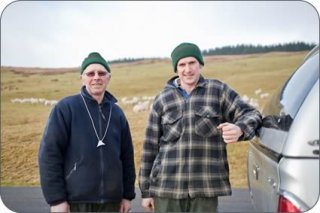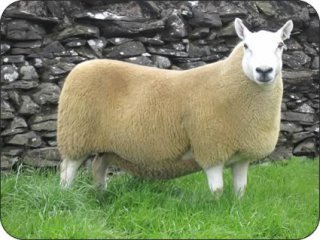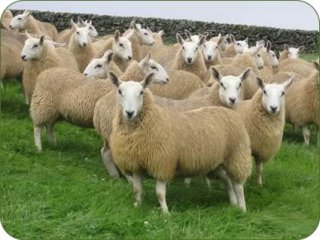
South Country Cheviots
Crossdykes
feature by Jennifer Mackenzie

Hardy South Country Cheviots and pedigree and crossbred Limousins are the favoured breeds at Crossdykes, Tundergarth, Lockerbie.
Alan and Billy Common farm the 1,600 acre hill farm and Billy and his wife Kirsty’s sons Murray, four, and Innes, two, are the eighth generation of the family to live at Crossdykes in more than 200 years.
South Country Cheviots have been run at Crossdykes for as long as the Common family have lived there, however, the pedigree Limousins are a much more recent addition to the stocking, with the herd being established in 1990.
The land is all enclosed and the best of the Cheviots are bred pure and run on the hill in six hefts which borders the Milk Water running through the valley. They are drafted at four and five crop.
The farm includes 200 acres of in-bye land where the Cheviots are crossed with the Bluefaced Leicester and it runs from 750ft to 1,050ft above sea level, with all the land in the Severely Disadvantaged Area. Silage is made off 70 acres of in-bye land along with 10 acres of hay.
The Commons have 880 South Country Cheviot ewes plus hoggs which are away-wintered. Of the ewes, 94 which go onto the in-bye land are crossed with the Bluefaced Leicester, with the remainder bred pure. Any not in lamb are chased with the Texel, producing a quality lamb which averaged £55.20 for 84 sold last year.
They also have nine Leicester females to produce their own rams and some for sale. Five years ago a lamb ram made £1,800.
While the majority of the sheep were lost in the 2001 foot and mouth epidemic contiguous cull, two lots of hoggs that were away wintered survived, retaining some of the flock’s original bloodlines. Re-stocking was with sheep from Mountbenger, Stirkfield and Castle Crawford.
Between 16 and 20 shearling rams are sold each year at the society sale in Lockerbie at the beginning of October. The top price was £8,000 pre-2001 and in 2010 18 shearlings averaged £624.

The Commons aim to breed a sheep that is good on its legs, with good skin and hair, with good width and bone.
Wethers and females not kept for breeding are sold store in September and October at Lockerbie and Longtown to average £53 a head last year for 550 sold. By the March April time they are earning a premium for the finishers who bought them, with recent prices running at around 200p per kg.
The Commons were one of the original breeders of Mules from the South Country Cheviot in the 1980s. The Mule lambs are sold in August through Longtown Mart where in the last few years they have had a top of £118 a head. Wether lambs have averaged up to £60 with an average for males and females of £84 a lamb for 140 sold last year.

“They are becoming a very popular sheep as they have good conformation, carcase qualities and skin,” said Billy. “They can be crossed with any commercial ram and produce two good quality lambs because of their milkiness without much supplementary feed.”
This year the in bye ewes produced their best lambing percentage scanned yet at 178. Draft ewes are sold at Lockerbie and Longtown to average £70 last year.
Billy Common’s commitment to the Southie is reflected in his membership of the society’s council.
The father and son team also fly the flag for the breed at summer shows, winning the reserve breed champion at the 2010 Royal Highland with a home bred three crop ewe which was also the interbreed sheep at Peebles
Traditionally, Galloways were run at Crossdykes, and a Limousin bull had been run commercially on the Galloway-Simmental cross cows.
The foundation cow of the Crossdykes Limousin herd was from Haltcliffe, bought at the Carlisle Limousin Red Ladies sale in 1990 as in in-calf heifer. Her first calf was the Cannon-sired Crossdykes Grace and her bloodlines can still be traced in the herd today.
The herd now numbers 22 cows plus some maiden heifers.
Top price achieved for a bull was at the February 2008 Perth society sale with Crossdykes Bobby which sold for 7,500gns to Ulverston pedigree breeder Alan Myerscough.
The bull was by Sarkley Thunderbolt, bought for 13,500gns at Carlisle in May 2004 with fellow pedigree breeder, George Wilson, Reddings, Moffat.
“We usually manage to produce some bulls for sale each year at Perth and Carlisle,” said Billy. “The majority are sold to commercial breeders from as far afield as Wales and Inverness, some of whom have come back for more bulls.”
In 2002 Crossdykes Rasta, a son of Sarkley Moonlight, made 6,000gns at the February Perth sale to a large commercial herd in the north of Scotland while two years later another Moonlight son, Uplands made 5,500gns topping the Carlisle sale.
Crossdykes Ellis was one of the first three sons of current stock bull Culnagechan Bullseye sold to average £4,500. Ellis sold at the February Stirling pedigree sale for 6,500gns while Elvis made 4,500gns at the October Carlisle sale.
While most of the bulls selected as stock bulls are assessed visually, the Commons do pay attention to beef values and the herd is performance recorded. With increasing demands from purchasers for high health status animals, the cattle are tested for Johnes and the herd is BVD accredited under the SAC Premium Health Scheme.
The herd is also closed and the 34 commercial Limousin cross cows are also home-bred, with all cattle grazing the hill in the summer and cows being fed silage in the winter.
Calving is in May for two months and again in September with the calves sold store at 11 to 12 months old through Lockerbie Mart, averaging up to £650 to include heifers not retained for breeding.
